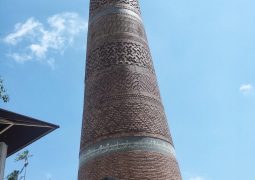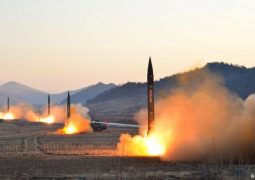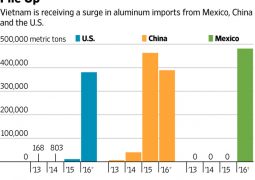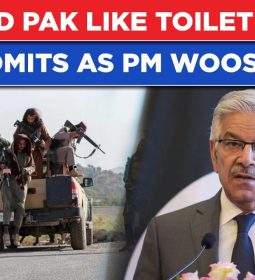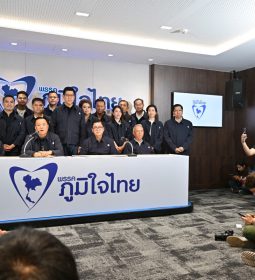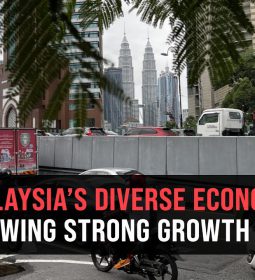India’s water crisis worsens: More than 500 arrested after protests and clashes
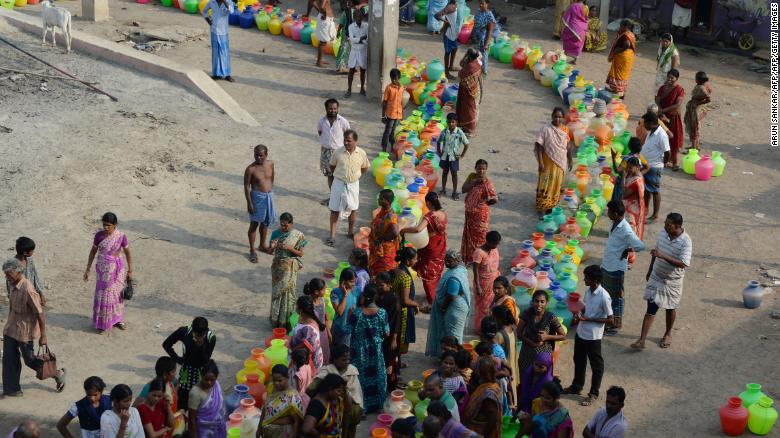
By Jessie Yeung and Swati Gupta, CNN
Updated 0736 GMT (1536 HKT) June 21, 2019
Millions of people are running out of water in this city 01:56
Millions of people are running out of water in Chennai, which is experiencing major droughts and a rapidly worsening water crisis.
At least 550 people were arrested Wednesday in the city of Coimbatore for protesting with empty water containers in front of the municipal government’s headquarters, accusing officials of negligence and mismanagement. Meanwhile, four reservoirs that supply Chennai, the state capital and India’s sixth largest city, have run nearly dry.
Lake Puzhal, the city’s largest, is the large body of water in the satellite image from Maxar below. On June 15, 2018, it was full of blue water.
SATELLITE IMAGE ©2019 MAXAR TECHNOLOGIES.
One year later, the reservoir has been reduced to an almost completely dry lake bed.
The same is true further south in the smaller reservoir of Lake Chembarambakkam, where only the deepest parts of the lake bottom still hold water.
SATELLITE IMAGE ©2019 MAXAR TECHNOLOGIES.
There was some respite for Chennai residents Thursday when the city received its first major rainfall of the year.
“The next two days will see light to moderate rainfall in the city. It will give relief for the intense heat that is there,” Dr. S. Balachandran, a senior official at the Indian Meteorological Department told CNN.
It was the first major rainfall since December, according to the Tamil Nadu Meteorological Department.
“Unfortunately this is forecast to be light to moderate rain and the reservoirs are almost dry. So, this won’t help in replenishment but will just give respite from the heat,” the department said. “The proper rain to fill up the reservoirs isn’t expected until November.”
Chennai recorded 29 millimeters of rainfall Thursday (1.14 inches) — the most the city has documented in the last six months combined.
With low groundwater levels and insufficient rainwater collection systems, the state government has resorted to trucking water directly into Chennai neighborhoods, where hundreds of thousands of residents wait in line for their meager allocation.
“I come here every night and early morning hours to collect (water) with my neighbor and my son,” said N Bhagyalakshmi, a Chennai resident. With her sons, she lugs about 20 pots of water home every morning.
In Chennai, India’s sixth largest city, millions of people are running out of water.
The situation in Chennai reflects an ongoing nationwide crisis as a fatal heat wave sweeps across the country, and cities from Mumbai to Delhi face dwindling water supplies.
People have begun fighting over water, with minor clashes across Chennai. Trucks bringing water into cities have even been hijacked and drivers attacked, said Jyoti Sharma, founder and president of FORCE, an Indian NGO working on water conservation.
In response to the ongoing crisis in Tamil Nadu, the Dravida Munnetra Kazhagam (DMK) opposition party for statewide protests on June 22.
“The government is not even acknowledging that there is a water crisis,” said DMK’s Saravanan Annadurai. “Only if they acknowledge that there is a crisis, we can find a solution.”
Annadurai accused the state government, which is led by the All India Anna Dravida Munnetra Kazhagam party (AIADMK) and is part of Prime Minister Narendra Modi’s ruling coalition, of “dismissing the reports as exaggeration by the media and the opposition.”
Annadurai added that that “restaurants have been closed, students are in schools where there is no water, people working in IT companies have been asked to stay at home.”
The state’s Madras High Court has ordered Chennai’s water supply agency to submit a report on the water scarcity, due next week.
Representatives of the AIADMK did not respond to a request for comment.
Mismanagement in the face of climate change
Droughts across India are an annually recurring event, and smaller towns have run out of water before. But Chennai is one of the first major cities to face such severe water shortages, exacerbated by a combination of climate change, for heat and poor planning.
Seasonal monsoon rains, which bring relief each year and replenish the country’s water supplies, are late this year. They usually begin at the exact same time at the start of June, and make their way across the country — but this year, the monsoon is more than two weeks late in some places.
In Chennai in particular, monsoon rains should have begun by June 1, but have yet to arrive. Rainfall over the country is only running about half of what it should be at this point of June.
Indian residents queue to get drinking water from a distribution tanker in the outskirts of Chennai on May 29, 2019.
Erratic rainfall has brought into sharp focus the insufficiency of alternative water harvesting systems, and residents across Tamil Nadu accuse the state government of water mismanagement.
When rare downpours do suddenly come, existing infrastructure often fails to store water adequately, said Sharma.
“The soil gets saturated very fast, you don’t have water harvesting systems in place, the rivers are full, there’s no space for the water to stay — it all goes out to the sea and away from the city,” she said.
India also heavily relies on groundwater for its water needs, but decades of drilling into the earth to reach water has led to severe ground water depletion.
Residents stand around with plastic pots filled with drinking water at a distribution point in Chennai on June 19, 2019.
This depletion and dependence is particularly concerning in large cities, where at least 60% of the population live in unauthorized settlements instead of government-designated residential areas, Sharma said. Around 820,000 people live in slums in Chennai, according to a 2017 report from the Tamil Nadu government.
These low-income families, without access to expensive private water tankers or rainwater harvesting systems, are almost entirely dependent on groundwater for basic needs — and thus are hit hardest in crises like this.
“The metro water from the pipeline is mixed with sewage, and it is not possible to use it,” said N Anand, a Chennai resident who has been collecting water from the government tankers every morning for the past month.
Swati Gupta reported from New Delhi. Jessie Yeung reported from Hong Kong. Brandon Miller also contributed to this report.
- Previous After national and global outcry, Russia to begin freeing captive whales from ‘jail’
- Next Man walks on footthe entire length of China’s Great Wall





